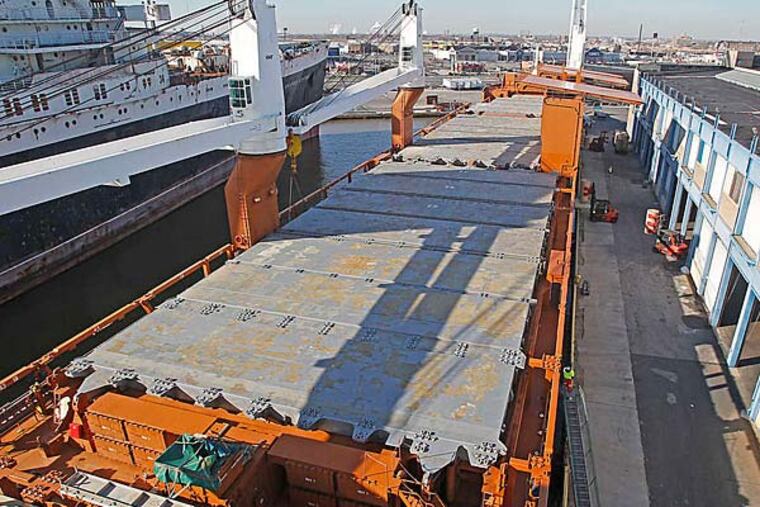Philly businesses are less rosy than the national average but still positive
A review of what business is actually doing — not just what owners or managers are saying — shows that Philly area companies aren't investing and borrowing quite as confidently as other Americans

There are signs that President Donald Trump’s threat to order U.S. companies out of China haven’t been taken seriously by Wall Street or Main Street so far.
Shares of large Philadelphia-area-based manufacturers that have exposure to China such as the pesticide-maker FMC, sensors-and-connectors giant TE Connectivity, and chemicals-maker Chemours have risen this year. Those stocks are up despite volatility in recent days as Trump and Chinese leaders trade accusations over who is to blame for import taxes (tariffs) and the growing “trade war” that has driven foreign orders down for the world’s two largest economies.
U.S. companies’ sales and profits remain robust. Citizens Bank’s Business Conditions Index, a mix of revenue data from the bank’s business customers, plus regional and national business sales, manufacturing and wage data, came in at 61 this summer, unchanged from last quarter, on a scale of 0 to 100.
That means a “healthy” majority of firms are expanding, according to the bank, which has the largest branch network in the region.
But that’s a national number. The eastern Pennsylvania index is only 53, a more modest optimism.
Why the glum edge here? “The Philadelphia region tends to be much more internationally oriented than, say, Western Pennsylvania,” said Dan Fitzpatrick, president of Citizens Bank of Pennsylvania.
“That is still positive. Companies are still growing. It’s just that uncertainty factors, like the trade battles with China, which affects companies’ Western European partners far more than us,” are starting to wear on regional companies, Fitzpatrick added. So “many companies are pausing.”
Fitzpatrick is also concerned about the one-two punch of the Philadelphia Energy Solutions oil-refinery shutdown and the Hahnemann University Hospital closing, which together cost the city close to 4,000 well-paid jobs — “a really big economic shock for our region,” he said. While other health-care providers are hiring, it will be tough for refinery workers to find wages above $40 an hour without leaving the area.
Another factor that has complicated decision-making for many midsize companies is the strong U.S. dollar. “It makes things tougher” for U.S. firms with foreign plants to bring profits back home, where they will buy less, Fitzpatrick noted. “Our advisers on foreign exchange and interest rate strategies are very busy” helping companies find strategies to maximize their foreign profits.
Does that mean bankers are urging U.S. firms to invest their profits abroad? “It’s a different strategy for every company,” Fitzpatrick hedged.
But if a strong dollar tends to make Americans reluctant to repatriate their profits, a strong dollar also attracts foreign investment, he points out: “While we see huge volatility in the U.S., American [company] valuations are still much higher than in Europe." As Europe slows, investors there are “desperately” looking for profits in the United States.
“Lots of European companies have been looking for family-owned companies in this region to acquire,” Fitzpatrick added. “They want to get their investment dollars into the U.S., because our growth rate is the highest among the mature economies.”
With lowered federal income taxes and U.S. interest rates, midsize Philadelphia-area companies such as UGI Corp., the King of Prussia gas supplier, and Quaker Chemical of Conshohocken are buying other operations — note UGI’s recent purchase of pipelines in the Western Pennsylvania gas fields, and Quaker’s purchase of its longtime Norristown-based rival Houghton International, which Citizens helped finance.
To be sure, some companies with big commitments to expensive Chinese factories don’t look too prosperous at the moment. The multinational Wilmington-based chemical-maker DuPont and pesticide-maker Corteva, which split apart this spring in the dissolution of the former DowDuPont, are both trading below their initial share prices. Still, it’s hard to know how much of that is the China effect. Both are also suffering from the companies’ failure, so far, to realize promised profit increases after three years of consolidation and cost-cutting.
And Livent, the Philadelphia-based lithium mining and processing company spun out by FMC, is trading below its April initial public offering price, on concerns its product, used in car batteries and smartphones, is now over-supplied, given the expected drop in demand growth.
The bankers are taking the long view, Fitzpatrick concluded: “We say, ‘This trade war will pass.’ ”